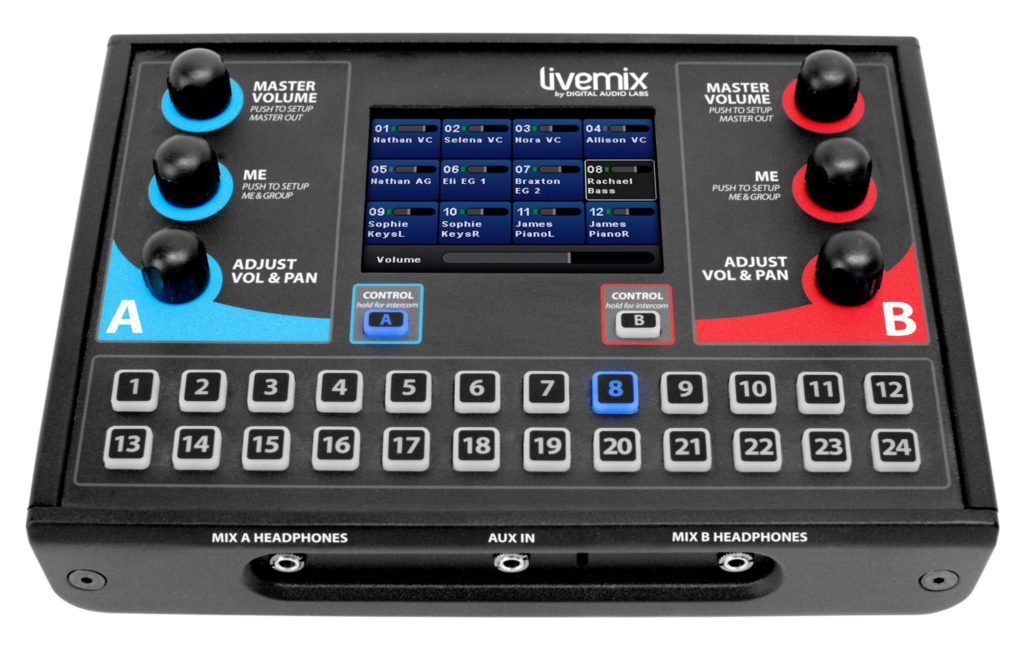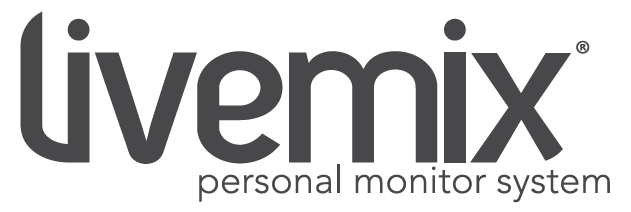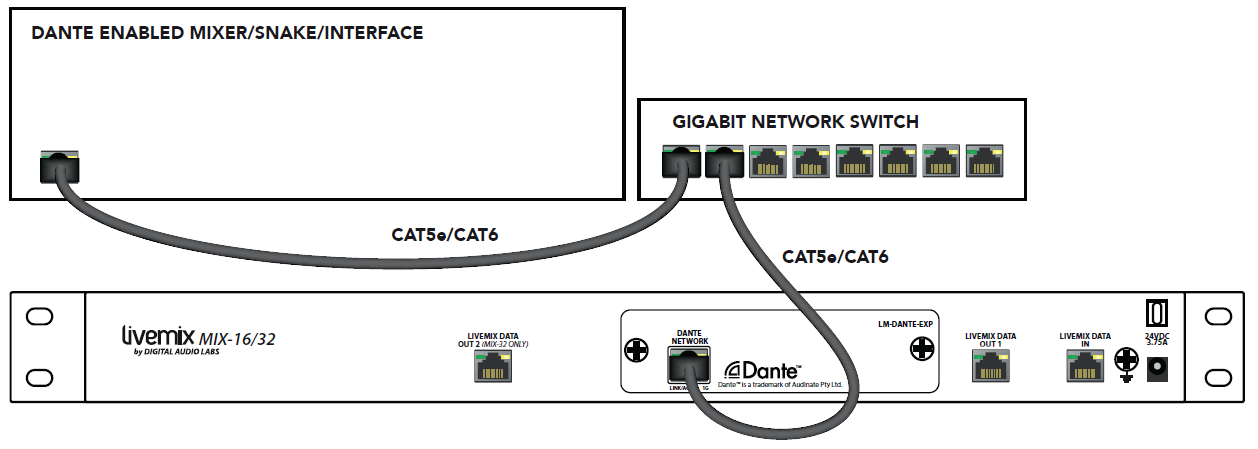Livemix Personal Monitor

SAFETY INSTRUCTIONS
TO REDUCE THE RISK OF ELECTRIC SHOCK, DO NOT REMOVE COVER. NO USER SERVICEABLE PARTS INSIDE. CONTACT DIGITAL AUDIO LABS FOR SERVICING.
The lightning flash with arrowhead symbol, within an equilateral triangle, is intended to alert the user to the presence of un-insulated and/or potentially dangerous voltage within the products enclosure that may be of sufficient magnitude to constitute a risk of electric shock to persons.
The exclamation point within an equilateral triangle is intended to alert the user to the presence of important operating and maintenance (servicing) instructions in the literature accompanying the appliance.
POWER CORD NOTICE FOR INTERNATIONAL OPERATIONPlease call Digital Audio Labs Support at 952-401-7700.
IMPORTANT SAFETY INSTRUCTIONS
- Read and understand this entire manual.
- Keep this manual available for reference.
- Heed all warnings and precautions in this manual and notices marked on the product.
- Do not use this product near water or damp environments.
- Do not block any ventilation openings. Install in accordance with the manufacturer’s instructions.
- Provide for proper airflow around product. Do not install near products that produce high levels of heat. Do not expose the unit to direct sun light or heating units as the internal components’ temperature may rise and shorten the life of the components.
- Do not defeat the safety purpose of the polarized or grounding-type plug. A polarized plug has two blades with one wider than the other. A grounding type plug has two blades and a third grounding prong.
- Protect the power cord from being walked on or pinched particularly at plugs, convenience receptacles, and the point where they connect to the product. Do not use the unit if the electrical power cord is frayed or broken.
- Only use attachments/accessories specified by the manufacturer.
- Unplug this product during lightning storms or when unused for long periods of time.
- Refer all servicing to qualified service personnel. There are no user serviceable components inside the product.
- The product shall not be exposed to moisture. Do not touch the unit with wet hands. Do not handle the unit or power cord when your hands are wet or damp.
- The product should be connected to a power supply only of the type described in the operating instructions or as marked on the product.
CARE
- From time to time you should wipe off the front and side panels and the cabinet with a dry soft cloth. Do not use rough material, thinners, alcohol or other chemical solvents or cloths since this may damage the finish or remove the panel lettering.
- The Livemix system is capable of delivering high levels of volume. Please use caution with volume levels, listen with the lowest possible volume for proper operation and avoid exposure to prolonged high volume levels.
- The manufacture cannot be held responsible for damages caused to persons, personal possessions, or data due to an improper or missing ground connection.
DIGITAL AUDIO LABS LIMITED WARRANTY
Digital Audio Labs warrants their products against defects in material and workmanship for a period of two years from date of purchase. During this period, Digital Audio Labs will, at its option, repair the defective unit or replace it with a new or rebuilt one.The warranty does NOT cover:
- Damage due to abuse, misuse, or accident.
- Damage due to operation contrary to the instructions in the product instruction manual.
- Units on which the product serial number has been removed or altered.
- Units that have been serviced by unauthorized personnel.
All implied warranties, including warranties on merchantability and fitness, are limited in time to the length of this warranty. Some states do not allow time limitations on implied warranties, so this limitation may not apply to you. Digital Audio Labs’ liability is limited to the repair or replacement of its product. Digital Audio Labs shall in no way be held liable for incidental or consequential damages resulting from the use of their product or its software, including, without limitation, damages from loss of business profits, business interruption, loss of business information or other pecuniary loss. Some states do not allow the exclusion or limitation of incidental or consequential damages, so the above limitation or exclusion may not apply to you.
REPAIR POLICY
Please do not return the product without obtaining an RMA number first. Contact Digital Audio Labs at [email protected] to acquire an RMA number. Do not return the product to the place of purchase. Please write the RMA number on the outside of the shipping carton. Any product sent to us without a valid RMA number will be refused. Include the following with the product: a brief description of the problem, your name, return shipping address, phone number and the RMA number. Do not include any accessories. DAL is not responsible for any damage to or loss of the product during transit. We recommend that customers obtain a receipt and tracking number for all packages shipped to us. Turnaround time on repairs is generally ten business days. If you live outside of the United States, please contact your local distributor for warranty service.
Please return product to:Digital Audio Labs Attn: RMA Number1266 Park Road Chanhassen, MN 55317USA
WARRANTY SERVICE
You will be required to pay the shipping charges when you ship your product to DAL. DAL will pay for return shipping via UPS ground. We reserve the right to inspect any product that may be the subject of any warranty claim before repair is carried out. For warranty service, we may require proof of the original date of purchase if you have not registered your product with DAL. Final determination of warranty coverage lies solely with Digital Audio Labs.
NON-WARRANTY SERVICE
If it is determined that the product does not meet the terms of our warranty, you will be billed for labor, materials, return freight and insurance. There is a $80 USD minimum charge for materials and labor. Appropriate shipping charges will be applied. We require payment in advance of repair by credit card; we accept Visa and Master Card. In the event the charges are over the minimum charge, DAL will contact you and inform you of the cost of the repair before any work is completed.
CONTENTS OF BOX
- MIX-16/MIX-32
- External Power Supply
- AC Power Cable
- System Quick Start
- Registration Card
INTRODUCTION
The MIX-16/MIX-32 is the Livemix central mixer and power distributor. The MIX-16/MIX-32 provides:
- 24-channel digital input
- 24-bit digital mixing and processing
- Power and audio distribution to attached personal mixers over a single network cable
- 16 discrete monitor mixes with the MIX-16
- 32 discrete monitor mixes with the MIX-32
ANATOMY OF THE MIX-16/MIX-32*

- EXTERNAL POWER SUPPLY CONNECTOR: Connect the included power supply here. Only use the power supply that is supplied with your MIX-16 or MIX-32. The MIX-16 is supplied with a 24V / 3.75A power supply. The MIX-32 is supplied with a 24V / 5A power supply. Contact support for a replacement power supply if necessary.
- LIVEMIX DATA IN: If using an analog input source and the AD-24, connect a shielded CAT5e or CAT6 cable from the Livemix Data Out port on the AD-24 to the Livemix Data In on the MIX-16/MIX- 32. This will be unused if using the LM-DANTE-EXP Dante Option Card.
- POWER SWITCH: This switch turns power on/off. The MIX-16/MIX-32 supplies power to connected Livemix personal mixers.
- CONTROL SURFACE PORTS: Each port supplies communication data and power to connected Livemix personal mixers (also called control surfaces) through a standard network cable.Two indicator lights on each port report device status information.
- The green light illuminates when a personal mixer has a valid connection with the MIX-16/MIX-32.
- The yellow light is a fault indicator. It may illuminate briefly when each personal mixer is powered on. If it remains lit, this indicates one of the following problems:1. The firmware on the personal mixer2. The network cable3. The port4. The personal mixer
- OPTION CARD SLOT: This slot is used to provide access to additional input formats. When using an option card, such as the LM-DANTE-EXP Dante card, the system may need to be configured for digital input. The system will default to the option card slot if one is installed. Otherwise, this can be done on the Livemix personal mixer (see Livemix CS-SOLO or CS-DUO User Guides for more information).
- LIVEMIX DATA LIGHT: This light will change color to indicate the audio and power status of the MIX- 16/MIX-32. If the light is off, the MIX-16/MIX-32 doesn’t have power. Any illuminated LED light color means that power is on.If using the AD-24 with analog inputs:• The light will illuminate green when the MIX-16/MIX-32 is receiving audio data.• The light will illuminate red when there is no audio data present.If using an option card (digital input):• A green light means communication is working. Please verify channel mapping from your audio source. (See LM-DANTE-EXP User Guide for more information).• A yellow light means at least one digital channel is not connected properly (See LM-DANTE-EXP User Guide for more information).• A red light means that at least one channel is reporting an error (See LM-DANTE-EXP User Guide for more information).
- USB PORT: The USB port connects to a Windows PC for firmware updating.
- LIVEMIX DATA OUT 1: This port connects to a Livemix DA-816 analog output rack unit.
- LIVEMIX DATA OUT 2 (MIX-32 ONLY): This port connects to a Livemix DA-816 analog output rack unit. If only using one DA-816, connect to the Livemix Data Out 1.
NOTE:If power is interrupted to the MIX-16/MIX-32, the personal mixer will automatically return to the last loaded mix when it powers back on. Additionally, the MIX-16/MIX-32 will automatically return to the last loaded Global Template.
SETUP DIAGRAMS
ANALOG INPUT TO MIX-16/MIX-32
DIGITAL INPUT TO MIX-16/MIX-32
MIX-16/MIX-32 TO LIVEMIX CS-SOLO/CS-DUO PERSONAL MIXERS
CONNECTING THE DA-816 TO THE MIX-16 AND MIX-32

CONNECTING TWO DA-816 UNITS TO THE MIX-32

SETUP AND OPERATION
Although the MIX-16/MIX-32 is the Livemix central mixer and power distributor, there aren’t any direct controls. Setting up the MIX-16/MIX-32 is simple and all configuration is done on a Livemix personal mixer (See the CS-SOLO or CS-DUO User Guide).
- If using the analog input, connect the Livemix Data Out port on the AD-24 to the Livemix Data In port on the MIX-16/MIX-32. Shielded CAT5e or CAT6 cable is required to make this connection. If using an option card, you will not use the Livemix Data In port.
- Connect each personal mixer to a Control Surface Port on the front of the MIX-16/MIX-32 with a CAT5e or CAT6 cable. These do not have to be in any particular order or sequence. Planning which Livemix personal mixer goes into which Control Surface Port may help identify each personal mixer when using the MirrorMix® remote mixing feature.
- Connect the power supply on the back of the MIX-16/MIX- 32 to an appropriate power source.
- Turn on the MIX-16/MIX-32.
NOTE:The audio data sent over the Livemix system is a proprietary data format. It will not work with a switch or a standard Ethernet network. When using an Option Card designed for networked audio use, such as the LM-DANTE-EXP, consult the Option Card user guide for information on how to connect to the network.
NOTE:Either CAT5e or CAT6 cabling is appropriate.
MIX-16/MIX-32 FIRMWARE UPDATE INSTRUCTIONS
The MIX-16/MIX-32 can be updated with a CS-SOLO/CS-DUO or a PC application.You can update with a CS-SOLO or CS-DUO if:
- The MIX-16/MIX-32 serial number is greater than 12- 02-01030
- The MIX-16/MIX-32 firmware is 1.01 or above
- The CS-SOLO/CS-DUO firmware is 1.31 or above
If your MIX-16/MIX-32 does not meet the criteria above, update with a Windows PC application. In most cases, this will bring your MIX-16/MIX-32 up to date and subsequent updates can be performed with the CS-SOLO/CS-DUO. For reference, both methods are listed below.
UPDATE FIRMWARE OF MIX-16/MIX-32 WITH THE PC APPLICATION:
- Update all CS-SOLOs and CS-DUOs to the latest version per the instructions above.
- Download the MIX-16/MIX-32 Update Application from http://www.digitalaudio.com/support
- Connect the USB port on the MIX-16/MIX-32 to a Windows computer.
- Wait for MIX-16/MIX-32 drivers to fully install.
- Run MIX-16/MIX-32 Update Application. A second set of drivers will be installed at the start of this process and may take a few minutes. Once the updater has started, a progress bar will appear. Do not turn off the power until the update is complete or you may damage the unit.
- PRESS Finish.
- Disconnect the MIX-16/MIX-32 from the PC and verify the update was successful by checking the firmware version with the CS-SOLO/CS-DUO.
UPDATE MIX-16/MIX-32 FIRMWARE WITH A CS-SOLO OR CS-DUO:
- Download the latest firmware: http://www.digitalaudio.com/support
- Unzip the firmware zip file and copy the LMUPDATE folder to the root directory of a USB flash drive (FAT Format). Please verify the LMUPDATE folder is not in another folder.
- Go to Livemix Version Info by pressing Mix Tools, Global Configuration and then Livemix Version Info.
- PRESS Update MIX-16/MIX-32 Firmware.
- PRESS Yes to update, or No to cancel.
- Insert USB flash drive containing the update, when prompted. PRESS Continue or Exit to cancel. Once the update has begun, do not turn off the power to the MIX-16/MIX-32 or you may damage the unit.
NOTE:
If updating with the CS-SOLO or CS-DUO does not work, please use the PC Application.Some updates take a while to complete. If updating the MIX-16/MIX-32 from the CS-SOLO/CS-DUO, it works best to have only one personal mixer connected.
LIVEMIX SYSTEM EXAMPLES
A Livemix system requires either an analog (AD-24) or digital input (option card), the MIX-16/MIX-32 central mixer, and at least one Livemix personal mixer. Below are some examples of what a basic system may look like.
ANALOG INPUT SYSTEM
1 x AD-24 Analog Input Rack Unit1 x MIX-16 Central Mixer4 x CS-DUO Dual Mix Personal Mixers4 x MT-1 Dual Position Mounts1 x CBL-CAT6-100 Shielded CAT6 Cable 100’ ** 4 x CBL-CAT6-50 Shielded CAT6 Cable 50’
DIGITAL INPUT SYSTEM
1 x MIX-16 Central Mixer1 x LM-DANTE-EXP Dante option card4 x CS-DUO Dual Mix Personal Mixers4 x MT-1 Dual Position Mounts1 x CBL-CAT6-100 Shielded CAT6 Cable 100’ ** 4 x CBL-CAT6-50 Shielded CAT6 Cable 50’
**Shielded cable between AD-24 and MIX-16 (and the DA-816 if applicable) is required. CAT6 is not required, CAT5e is acceptable.
ANALOG OR DIGITAL?Users receiving their audio from an analog source will use the AD-24. Using the TRS or DB-25 inputs, audio from the source is made available to the Livemix system.Users receiving their audio from a digital source will use the Option Card (LM-DANTE-EXP). This is an option card that is installed in the MIX-16/MIX-32 and allows the Livemix system to receive audiofrom a digital device or network.PERSONAL MIXER / CONTROL SURFACELivemix needs at least one connected personal mixer to make a mix. Each Livemix personal mixer connects via CAT5e/CAT6 cable to one of the ports of the MIX-16/MIX-32. Using various controlson the unit, users can each create their own custom mix, which is then output to headphones, in-ear monitors or stage monitors, directly from the personal mixer or Livemix DA-816 analog output unit.
TROUBLESHOOTING
|
The Livemix MIX-16/MIX-32 is not powering on correctly. |
Verify that you have connected the external power supply to a working power outlet. |
| Verify that the front panel power switch is set to ON. | |
|
I am not seeing the “Livemix Data” light illuminate. |
If the Livemix Data light is not illuminating, there is a problem with the power to the MIX- 16/MIX-32. Check to make sure that the power supply is connected to the MIX-16/MIX-32 and that all the cables are secure. Also verify that the power supply is plugged into an appropriate power source and that the power cable from the source to the power supply transformer is securely attached. |
|
I was planning on feeding the MIX-16/MIX-32 from my digital mixer, but do not see the right connector to use on the MIX-16/MIX-32. |
The MIX-16/MIX-32 interfaces with digital consoles through the use of an option card that inserts into the MIX-16/MIX-32. |
|
There is a clicking or popping sound in my mix. |
Audible clicking and popping is usually an issue with the clock source. If you are using Livemix with a Dante network, make sure that your console or Dante device is set to be the Master and Livemix is set to be the Slave.
This can be done through Dante Controller software on a Windows PC or Apple computer. NOTE: If you desire to have your console’s internal clock be the clock source, select this configuration setting on your console. Then in Dante Controller, set your console’s Dante option card to be the Master Dante device on the Dante network and select “Sync to External”. |
Open Source Statement
The Livemix MIX-16/MIX-32 firmware includes the open source software module FreeRTOS, which is licensed under the terms of the GNU General Public License (version 2) AND MODIFIED BY the FreeRTOS exception, as outlined in the FreeRTOS license. In accordance with those licensing terms, we must provide you the source code for the version of FreeRTOS used in the MIX-16/MIX-32. You may download the FreeRTOS source code at http://www.digitalaudio.com/open-source-center
References
[xyz-ips snippet=”download-snippet”]






